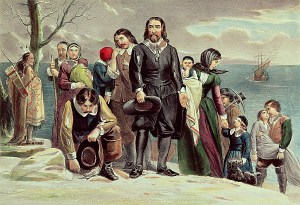(Repeat from November 2015)
Halloween is over and with November and the depressing time change in the U.S., our attention turns to the holidays ahead. And first up is Thanksgiving and the yearly looking back to our Pilgrim forebears.
Many years ago I used to pull down my old Classics Club volume of William Bradford’s History of Plymouth Plantation every November and read through it. So I just pulled down my beloved Classics Club edition once again. How many of you subscribed to those old Classics Club editions back when?

Anyway, those of you who love Great Literature, if you need a reason to spend a few minutes every week really getting into the spirit of Thanksgiving, then join me during November as we look at the most famous document of Plymouth Rock and the Pilgrims.
The actual book is quite a read, truthfully, so I am just going to look a few of the most famous passages. But here is the link to the full text at Project Gutenberg: http://www.gutenberg.org/ebooks/24950.
If you go back to really old textbook anthologies of American Literature, you will
often find them beginning the literature of the United States with William Bradford. Who knows, maybe some books still begin American Literature with Bradford and the New England Pilgrims.
That’s crazy, of course. I mean, the Pilgrims landed at Plymouth Rock in 1620. By 1620 Santa Fe, New Mexico and San Antonio, Texas were already flourishing American cities with intellectual cultures developing. Columbus, of course, had already written of his voyages. Thomas Harriot had written A Brief and True Report of the New Found Land of Virginia. Perhaps, more striking, the tribal peoples of North America had long been developing a dynamic and powerful literature for centuries. Surely, all these peoples were Americans. Oh well. Messy facts too often detract from wonderful and sentimental traditions.
Accordingly, William Bradford was one of the greatest of colonial Americans, a man large in spirit and wisdom, wholly consecrated to a mission of which he regarded himself as an instrument of God. The early history of Plymouth Colony was the history of his leadership, and, in fact, tiny Plymouth occupies a position in history wholly incommensurate with its size.
Like the patriarchs of the Old Testament, William Bradford in History Of Plymouth Plantation “recorded God’s ‘choosing’ of His people, their exile, and their wanderings”
November is the month we celebrate the Pilgrims and Plymouth Rock in the American Thanksgiving tradition. Let’s celebrate Thanksgiving month by taking a look at William Bradford’s History of Plymouth Plantation.

